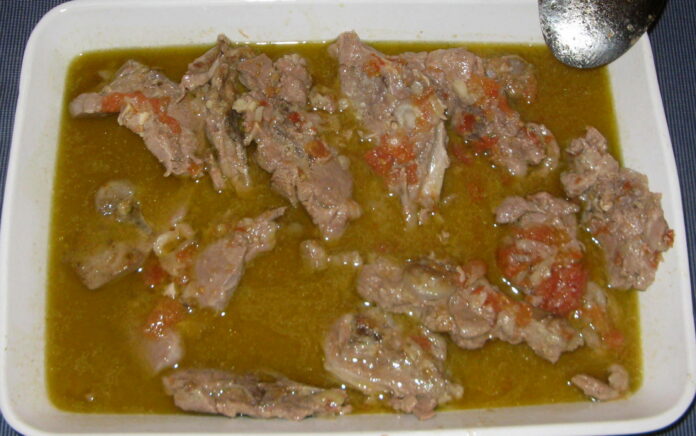Lamb meat, which is very tender and succulent, is one of the most produced meats in Alentejo. The stew is the most popular dish made with this specific meat, not only because of the way it is cooked but also because of how it is presented.
This particular recipe is from a municipality in Évora District called Reguengos de Monsaraz. It is a true gem of Portuguese traditional cuisine. The popularity of lamb meat is showcased, to a large extent, by the municipality’s gastronomic week, which is dedicated specifically to the cooking and tasting of lamb dishes. This stew is one of that week’s most well-known, sought-after culinary delights.
Portuguese Lamb Stew Recipe
Ingredients (8 people)
- 2 kg (4.4 pounds) of lamb meat
- 500 grams (1.1 pounds) of onion
- 2 tablespoons of flour
- 200 grams (0.44 pounds) of lard
- 5 garlic cloves
- 1 bay leaf
- 1 tablespoon of peppercorns
- 1 dessertspoon of sweet paprika
- 1 small chili pepper
- 1 kg (2.2 pounds) of homemade bread
- Salt
Instructions
- Start by cutting the lamb meat into pieces, and dip them in flour.
- Then, take 3 spoons out of the 200 grams of lard, and place the remaining inside a clay pot.
- Heat the clay pot with the lard inside it for a bit, place the meat on it, and let it fry for another bit until it is brown.
- On the side, in another clay pot, put the other 3 spoons of lard and braise the chopped onions, the sliced garlic cloves, and the peppercorns. Cook until the onions are soft and transparent.
- Then, add the already browned meat to the second clay pot, the remaining seasonings (bay leaf, sweet paprika, chili pepper, and salt), and enough water to make the stew (start with a bit of water, and you can add more later on, if you think it is necessary).
- Cover the pot and let it cook for one hour and a half, more or less, at medium/low heat.
- When it is done, taste it and rectify the seasoning if needed.
When serving, slice the bread and pour the broth on top. The meat will be served on the side, in another recipient, but at the same time as the bread with the broth.


